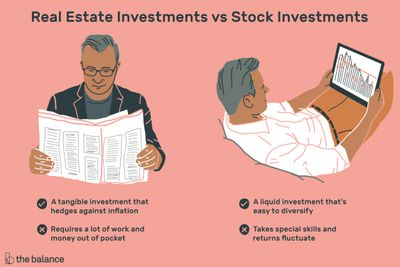Investments in Equity Or Real Estate?
Read latest blogs and articles from Housystan

The Information mentioned here was last updated on:
29/1/2026Investing in Equity or Real Estate: What You Need to Know
Investing is a key strategy for building wealth, but the choice between investing in equity or real estate can be challenging. This article delves into the fundamentals of both asset classes, helping you make an informed decision. Whether you’re a seasoned investor or new to the scene, understanding the benefits and risks of each option is crucial.
What is Equity Investment?
- Verified Tenants/Buyers
- Unlimited Property Listing
- Zero subscription/charges fee
Equity investment involves buying shares of a company, giving you partial ownership. When you invest in stocks, you're essentially investing in the company’s future potential.
Key Characteristics of Equity Investments
- Liquidity: Equities are generally more liquid than real estate. Stocks can typically be bought and sold quickly through stock exchanges.
- Volatility: Equity markets can be volatile, with stock prices influenced by a myriad of factors including market trends, economic data, and company performance.
- Growth Potential: Stocks have the potential for high returns, especially in growth sectors where a company can rapidly expand its business.
- Income: Many stocks offer dividends, providing regular income in addition to potential capital gains.
What is Real Estate Investment?
Real estate investment involves acquiring property to generate income or appreciation. This can include residential, commercial, or industrial properties.
Key Characteristics of Real Estate Investments
- Tangibility: Real estate provides a tangible asset, which can be reassuring for many investors.
- Stability: Generally, real estate prices are more stable compared to stocks, although they can still be affected by regional or national economic conditions.
- Income: Real estate can provide a steady stream of rental income and has the potential for value appreciation over time.
- Leverage: Real estate purchases can often be leveraged using borrowed funds, potentially enhancing returns.
Comparing Equity and Real Estate
To decide between equity and real estate, consider the following factors:
Risk and Reward
- Equity: Offers potentially higher returns but comes with greater volatility. Ideal for those comfortable with market fluctuations.
- Real Estate: Typically less volatile with steadier returns. Suitable for those looking for long-term stability.
Time Horizon
- Equity: Can be more suitable for shorter investment horizons due to its liquidity, allowing for quicker adjustments to your portfolio.
- Real Estate: Better for long-term horizons, as properties can appreciate significantly over extended periods.
Management Effort
- Equity: Requires monitoring of market conditions and company performance but is relatively hands-off once you build your portfolio.
- Real Estate: Involves active management, especially if dealing with tenants and property maintenance.
Tax Considerations
- Equity: Benefits include lower long-term capital gains taxes and some tax-advantaged retirement accounts like 401(k)s or IRAs.
- Real Estate: Offers tax deductions related to mortgage interest, property taxes, and depreciation, which can enhance returns.
Diversification Benefits
Diversification is crucial to mitigate risks. Including both equities and real estate in your investment portfolio can provide balance and improve overall returns.
Equity Diversification
- Invest in a mix of domestic and international stocks.
- Consider various sectors to spread economic exposure.
Related Reading: [How to Diversify Your Investment Portfolio]()
Real Estate Diversification
- Mix residential, commercial, and industrial properties.
- Invest in different geographical locations to reduce risk tied to local economic changes.
Addressing Inflation
Both equities and real estate can serve as hedges against inflation, but they do so differently.
- Equity: Long-term stock returns generally outpace inflation, offering growing dividends that help counteract declining purchasing power.
- Real Estate: Property values often rise with inflation, and rental income can increase over time, providing a direct hedge.
Accessing Global Markets
Global diversification is an attractive strategy for many investors.
Equity Markets
- Access global companies and emerging markets through international stocks or Regional ETFs.
Real Estate Markets
- Consider international real estate investments for broader exposure; however, be aware of currency risks and legal differences.
Online Platforms and Tools
Modern technology has made both equity and real estate investing more accessible.
For Equity
- Robo-Advisors: Automated platforms provide diversified portfolios with minimal effort.
- Online Brokers: Offer an abundance of resources for trading and research.
For Real Estate
- REITs (Real Estate Investment Trusts): Provide real estate exposure without the need to own physical properties.
- Crowdfunding Platforms: Allow investment in real estate projects with lower initial capital.
Conclusion: Your Investment Strategy
Choosing between equity and real estate depends on various factors including your financial goals, risk tolerance, and investment horizon. Many investors find value in integrating both into their portfolios. By understanding the unique advantages and considerations of each asset class, you can create a diversified investment strategy that aligns with your specific needs and objectives.